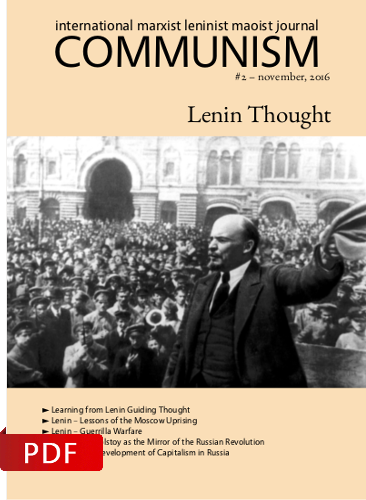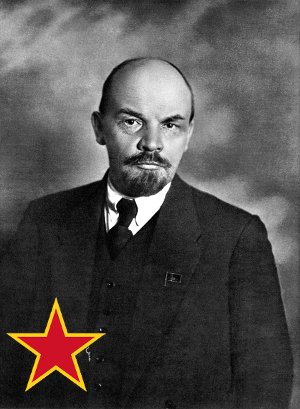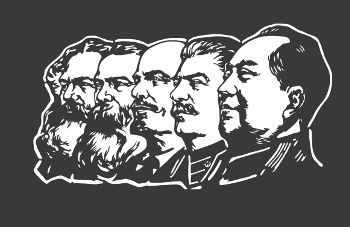 Next year, all the genuine revolutionaries in the world shall hail the October Revolution, the seizure of power in Russia in 1917. With the great Lenin at the head of the “Bolsheviks” forming the majority of the Russian Social Democratic Labour Party, the revolutionaries were able to overthrow the reactionary state and establish Socialism.
Next year, all the genuine revolutionaries in the world shall hail the October Revolution, the seizure of power in Russia in 1917. With the great Lenin at the head of the “Bolsheviks” forming the majority of the Russian Social Democratic Labour Party, the revolutionaries were able to overthrow the reactionary state and establish Socialism.
As Communists following the path of 1917, we want to profit from this hundred anniversary coming to point out a very important aspect of the October Revolution : the question of the direction, i.e. the importance of Lenin.
If we want to understand historically the October Revolution and if we want to stress next year its importance, then we will have to present it with all his content and therefore also to express the signification of Leninism.
The October Revolution was not a coup d’etat, but a leap in the revolutionary process led by Lenin. We call here to study two documents of importance and written by Lenin during the year 1906.
Both the “Lessons of the Moscow Uprising” and “Guerrilla Warfare” give very important lessons to revolutionaries on the spirit necessary to go in the direction of the general insurrection.
When we speak of People’s War as universal military theory of the proletariat, we don’t mean by that that the 1917 revolution is in contradiction with this theory elaborated by Mao Zedong and explained by Gonzalo.
On the contrary, Lenin went in the sense of People’s War, because he was a genuine revolutionary, understanding that Political power grows out of the barrel of a gun. As Lenin points it out :
“A Marxist bases himself on the class struggle, and not social peace.
In certain periods of acute economic and political crises the class struggle ripens into a direct civil war, i.e., into an armed struggle between two sections of the people. In such periods a Marxist is obliged to take the stand of civil war.
Any moral condemnation of civil war would be absolutely impermissible from the standpoint of Marxism.”
The October Revolution couldn’t happen without this scientific approach of Lenin, which lacked for example people knowing as well Marxism as Georgi Plekhanov and Karl Kautsky. Both played historically an important role, but were not able to understand imperialism and the question of the state, and therefore of revolution.
That’s why finally, Lenin opposed them. Already in 1906, Lenin presented the situation which was coming, where armed struggle would be unavoidable and the key in the battle for power. He said, then :
“Let us remember that a great mass struggle is approaching. It will be an armed uprising. It must, as far as possible, be simultaneous.
The masses must know that they are entering upon an armed, bloody and desperate struggle.
Contempt for death must become widespread among them and will ensure victory.
The onslaught on the enemy must be pressed with the greatest vigour; attack, not defence, must be the slogan of the masses; the ruthless extermination of the enemy will be their task; the organisation of the struggle will become mobile and flexible; the wavering elements among the troops will be drawn into active participation.
And in this momentous struggle, the party of the class-conscious proletariat must discharge its duty to the full.”
The revolutionary Party knows that the reactionary state has to be destroyed ; the destruction of the state apparatus is the very strategical aim.

The revolutionary process consists precisely in this destruction, with the construction of New State through the Red Army, in a non-linear process where the People’s War progress can not be historically stopped by the reaction, because it carries the New against the Ancient.
And this is true also for the World Revolution, as World People’s War. The October Revolution was the first component of the first wave of it, followed by the Chinese Revolution of 1949 and The Great Cultural Proletarian Revolution beginning in 1966.
Now, we follow this path, opened by Lenin, working to be a part of the second wave of the World Revolution.
For this reason, we want to call to use a new concept : the one of Lenin Thought. The concept of Guiding Thought of revolution is the heart of Maoism ; it explains that a Leadership is generated in the revolutionary process, that a person synthesizes in a Dialectical Materialist way the understanding of the situation, showing the path to follow.
In the case of Russia, two works particularly show the ability of Lenin to understand the society, its history, its culture, its development. Published in 1899, « The Development of Capitalism in Russia » is a work explaining how capitalism has developed itself in the countryside and why therefore the populist ideology of the “Narodniks” is wrong.
Published in 1908, “Leo Tolstoy as the Mirror of the Russian Revolution” give very important indications on the evolution of the mentality of Russian society, seen through the works of a great artist.
It is obvious that Lenin was a great Leader who, like Mao, understood the historical situation, and therefore, in the same way that there was a Mao Zedong Thought, there was a Lenin Thought, carrying both an aspect particular to the Russian Revolution and another being universal.
We think also that the use of this concept will help to understand the role of Stalin in a proper way. Stalin understood the importance of Lenin and developed Leninism as the second stage of Marxism.
Stalin said, in the The Foundations of Leninism :
“Some say that Leninism is the application of Marxism to the conditions that are peculiar to the situation in Russia.
This definition contains a particle of truth, but not the whole truth by any means. Lenin, indeed, applied Marxism to Russian conditions, and applied it in a masterly way.
But if Leninism were only the application of Marxism to the conditions that are peculiar to Russia it would be a purely national and only a national, a purely Russian and only a Russian, phenomenon.
We know, however, that Leninism is not merely a Russian, but an international phenomenon rooted in the whole of international development. That is why I think this definition suffers from one-sidedness (…).
Leninism is Marxism of the era of imperialism and the proletarian revolution. To be more exact, Leninism is the theory and tactics of the proletarian revolution in general, the theory and tactics of the dictatorship of the proletariat in particular.
Marx and Engels pursued their activities in the pre-revolutionary period, (we have the proletarian revolution in mind), when developed imperialism did not yet exist, in the period of the proletarians’ preparation for revolution, in the period when the proletarian revolution was not yet an immediate practical inevitability.
But Lenin, the disciple of Marx and Engels, pursued his activities in the period of developed imperialism, in the period of the unfolding proletarian revolution, when the proletarian revolution had already triumphed in one country, had smashed bourgeois democracy and had ushered in the era of proletarian democracy, the era of the Soviets.
That is why Leninism is the further development of Marxism.”
Stalin did nearly understood the Lenin Thought. He always put himself in the propaganda as Lenin’s best disciple ; Stalin’s Party Card from the Communist Party of the Soviet Union (bolshevik) was only the number two, the honour of the number one being given to Lenin, who was already dead.
Nevertheless, Stalin didn’t know the concept of Thought and of course, this brought problems in the understanding of what is universal and what is particular in Leninism. As the Communist International was for example based on Leninism without any distinction of the difference of it with Lenin Thought, it brought some errors, producing an administrative way of understanding.

In the same way, the History of the All-Union Communist Party (Bolsheviks): Short Course was certainly a valuable book for all the communists in the world. But it was not possible to understand the situation in its own country only with this book – and it was the most printed book by the International Communist Movement, until the “little red book” published in China.
It shows how rich historically Leninism was, with a dialectical character : a particular and an universal one. Of course, here a great attention must be given to the attempt made by the Revisionists to pretend that the universal aspect was in fact a particular one : this is how the Khrushevists deformed Marxism-Leninism.
In hailing the October Revolution next year, we will so to be very careful to protect the content of Leninism, explain its universal and its particular aspects, condemning the Leftists the attempts to negate the Leninist stage, without falling into the trap of Revisionism who will try to deform it.
Without that, we won’t be able next year to call to understand the meaning of the October Revolution for today’s world, to study Maoism as third stage of Marxism, to practice People’s War as universal revolutionary way.
November 2016
Organization of the workers of Afghanistan (Marxist-Leninist-Maoist, principally Maoist)
Marxist Leninist Maoist Center of Belgium
Communist Party of France (marxist leninist maoist)